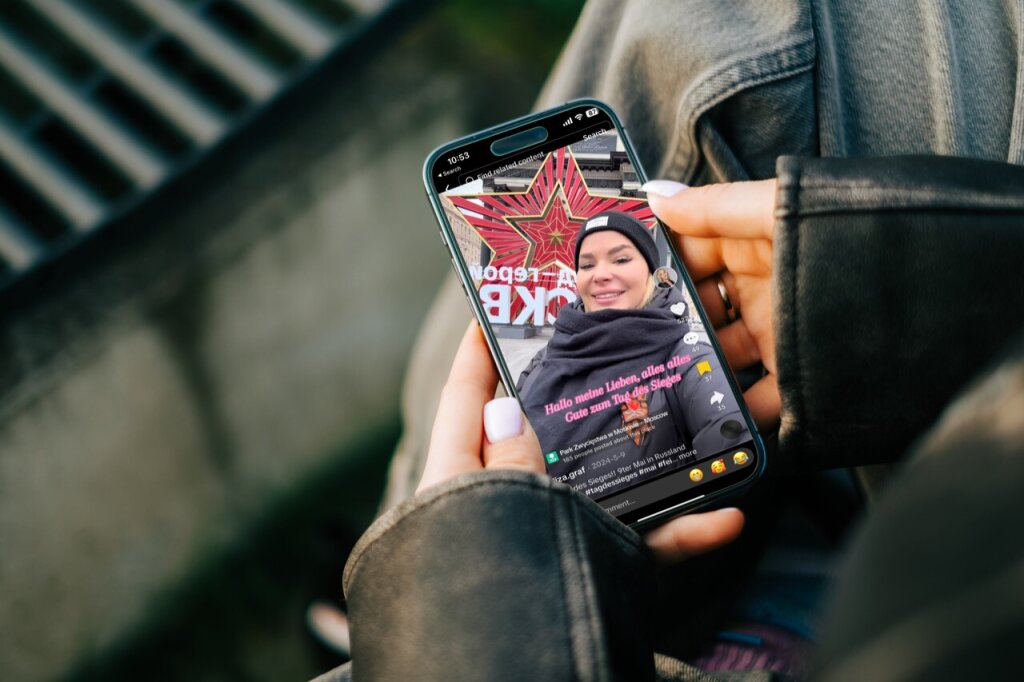This event will be hosted in hybrid format. RSVP to attend in person. Register for the Zoom meeting.
The Russian state systematically distorts widely accepted historical viewpoints on key events such as World War II or the annexation of Crimea with the aim to influence societies abroad and ultimately serve its own geopolitical interests.
The Russian state systematically distorts widely accepted historical viewpoints on key events such as World War II or the annexation of Crimea with the aim to influence societies abroad and ultimately serve its own geopolitical interests. This transnational battle for interpretive sovereignty over historical and contemporary events on the European continent has escalated further since 2022, becoming known as information wars, or more pointedly, as memory wars. This war is waged predominantly in the digital sphere and social media platforms play a key role in shaping historical discourses, belonging and the perception of the homeland for migrants and their descendants. The Kremlin’s informational influence abroad first targets Russian speakers, aiming to influence their political attitudes and thus shape public opinion abroad. This, in turn, can deepen societal divisions and challenge cohesion amidst competing narratives.
Our research is based on semi-structured interviews among young people (first generation migrants, as well as the children of migrants) with a focus on how they position themselves within conflicting offers of historical belonging. We interviewed 20 young Russians who arrived in Germany after February 2022 and 20 young Russians who underwent their socialisation in Germany. We expose individuals to contradictory interpretations of history, and therefore offers of belonging, to respond to three research questions: 1) Do people notice contradictions in interpretations of history and how do they deal with them? 2) What senses of belonging do individuals draw on when they are confronted with conflicting historical narratives? 3) How do migrants and their descendants differ - or not - in their reactions?
We focus on three key historical topoi, each characterised by varying degrees of mediation and lived experience. First, historical arguments that justify Russia's annexation of Crimea, which is part of lived memory. Second, the ordinary times of the Soviet Union and socialism in East Germany, situated between the immediacy of lived experience of older family members and the mediated narratives conveyed through eyewitness accounts. Third, representations of World War II, a heavily mediatised part of history that is no longer within the realm of lived experience.
Félix Krawatzek is a political scientist and, since September 2018, a senior researcher at Centre for East European and International Studies (ZOiS) in Berlin, Germany, where he coordinates the research cluster Youth and Generational Change. He is also an Associate Member of Nuffield College (University of Oxford). His research focuses on the comparative analysis of politics in Eastern and Western Europe. Félix Krawatzek is particularly interested in the role of youth in politics, the significance of historical representation in political processes, and questions related to migration and transnationalism. Before joining ZOiS, Félix Krawatzek held a British Academy Postdoctoral Fellowship at the University of Oxford’s Department of Politics and International Relations. He finished his doctorate at the University of Oxford and was a visiting fellow at Sciences Po Paris (Centre d’études et de recherches internationales) and at the Minda de Gunzburg Center for European Studies at Harvard University. Since September 2022, he heads the ERC-funded project Moving Russia(ns): Intergenerational Transmission of Memories Abroad and at Home (MoveMeRU).
Sophia Winkler is a visiting scholar at Jordan Center and doctoral researcher at the Centre for East European and International Studies (ZOiS) in Berlin, Germany. She analyses the transnational social media space between Russia and Germany and its effects on young Russians in constructing and contesting their identities, as part of Dr. Félix Krawatzek’s project “Moving Russia(ns): Intergenerational Transmission of Memories Abroad and at Home (MoveMeRU),” funded by the European Research Council, in collaboration with the Chair of Political Communication with a Focus on Eastern Europe and the Post-Soviet Region at the University of Passau, Germany. She focuses on interpretive qualitative methods, with research interests in memory and identity studies, social media and conflict transformation. Sophia holds a Bachelor's degree from the Centre for Translation Studies at the University of Vienna, Austria, and a Master's degree from the Institute for European Global Studies at the University of Basel, Switzerland. She has previously worked in the policy realm at the EU and OSCE, as well as on Swiss peace policy regarding Ukraine. Her PhD project is available here: https://www.zois-berlin.de/en/research/externally-funded-projects/movemeru/mediaanalysis
Picture: Adobe Stock from nikkimeel; TikTok screenshot @liza.graf



